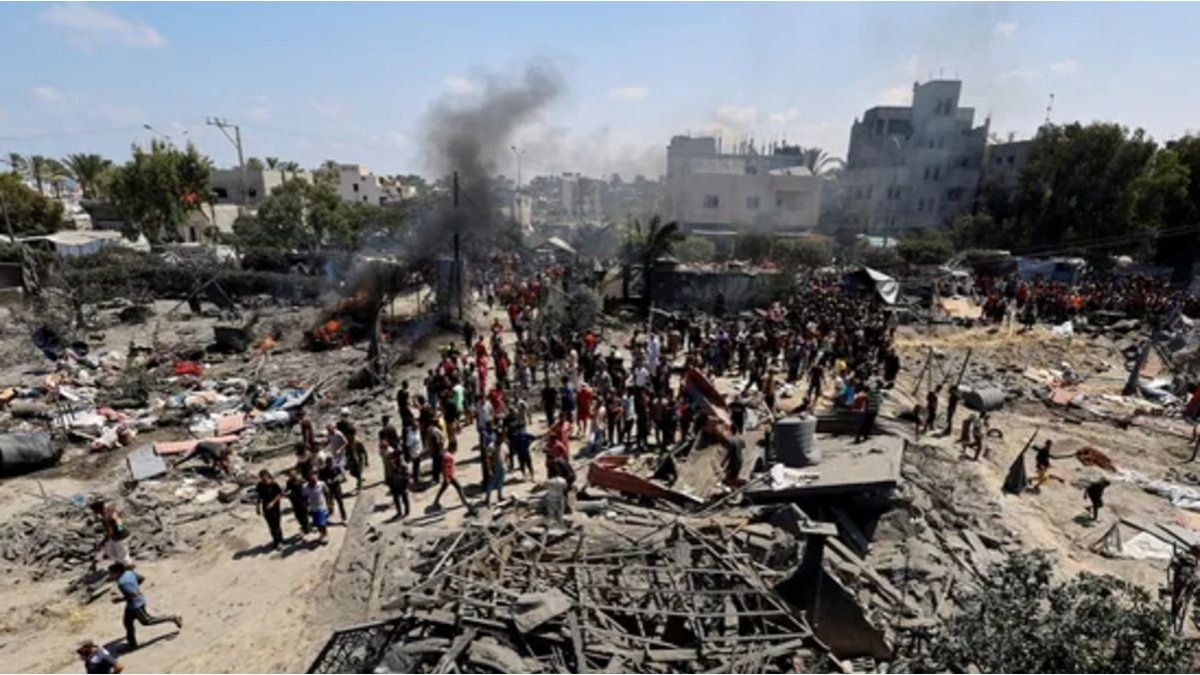After the UN Security Council has already failed several times to pass a resolution with a humanitarian focus on the situation in the Gaza Strip, there is now a result. Germany abstains – and causes criticism.
The UN General Assembly has adopted a resolution to improve the humanitarian situation and call for an immediate ceasefire in the Gaza Strip. The paper achieved a necessary two-thirds majority in New York.
120 countries voted in favor, 14 against, 45 abstained, including Germany. However, resolutions of the UN General Assembly are not legally binding, but are considered symbolic. The more powerful UN Security Council, whose resolutions are binding, had previously failed several times to pass a resolution with a humanitarian focus on the situation in the Gaza Strip.
The resolution that has now been adopted condemns, among other things, all violence against Israeli and Palestinian civilians, calls for the immediate and unconditional release of all civilians “illegally detained” and demands unhindered access for humanitarian aid to the Gaza Strip. The text also calls for an “immediate permanent and sustainable humanitarian ceasefire” that should lead to a “cessation of hostilities.”
Israel condemns resolution – Hamas welcomes it
As expected, the resolution met with mixed reactions from the parties to the conflict. “We firmly reject the UN General Assembly’s despicable call for a ceasefire,” Israeli Foreign Minister Eli Cohen wrote that night on the X platform, formerly Twitter. “Israel intends to eliminate Hamas.” This is how the world dealt with the Nazis and the Islamic State (IS) terrorist militia, he continued.
After the vote in the UN General Assembly in New York, Israel’s UN Ambassador Gilad Erdan spoke of a “dark day for the UN and for humanity” that would go down in history with shame. Everyone has seen that the United Nations no longer has “an ounce of legitimacy or relevance.”
The Islamist organization Hamas, which rules in the Gaza Strip and is responsible for the major attack on Israel on October 7th, praised the adoption of the resolution and called on the UN to take measures to implement it.
That’s why Germany abstained
Foreign Minister Annalena Baerbock justified Germany’s abstention by saying that from a German perspective the paper was not balanced enough. “Because the resolution does not clearly name Hamas terror, does not demand the release of all hostages clearly enough and does not affirm Israel’s right to self-defense, we and many of our European partners decided not to agree to the resolution in the end,” said Baerbock after the Vote as per announcement.
Canada had previously introduced an amendment to the resolution condemning the “terrorist attacks by Hamas” and the hostage-taking and calling for the immediate and unconditional release of the hostages. However, this addition failed to achieve the necessary two-thirds majority.
Before the vote, the member states were divided. For example, while the representatives of Egypt and Qatar advocated for the adoption of the resolution, the USA spoke out clearly against it. The session of the UN General Assembly was also called because the UN Security Council had not yet been able to agree on a resolution with a humanitarian focus. It was only on Wednesday that two draft resolutions failed again in the committee. Malta then announced that the ten non-permanent members of the UN Security Council wanted to submit their own resolution.
Criticism of German abstention
Israel’s ambassador to Germany, Ron Prosor, called on the Federal Republic to clearly support his country at the United Nations. “We need Germany’s support at the UN,” said Prosor in a greeting to the state party conference of the North Rhine-Westphalian CDU in Hürth. Abstaining from a vote “because you cannot directly say that Hamas is responsible for this cruel massacre is not enough,” he criticized.
The German-Israeli Society also sharply criticized Germany’s abstention from a vote on a UN resolution on the humanitarian situation in Gaza. “How can Germany abstain from a UN resolution that has the sole aim of delegitimizing Israel’s right to self-defense? Germany should have clearly voted no,” said the society’s president, Volker Beck, according to the statement.
Appeal from the World Health Organization
The WHO is now once again calling on the conflicting parties in the Gaza war for an urgently needed ceasefire. Reports of bombings near major hospitals are of great concern. The WHO reiterated that it was impossible to evacuate patients without endangering their lives. Clinics across the Gaza Strip are already at capacity due to the number of injuries so far and cannot cope with the dramatic increase in the number of patients while at the same time housing thousands of civilians.
Source: Stern
I have been working in the news industry for over 6 years, first as a reporter and now as an editor. I have covered politics extensively, and my work has appeared in major newspapers and online news outlets around the world. In addition to my writing, I also contribute regularly to 24 Hours World.




